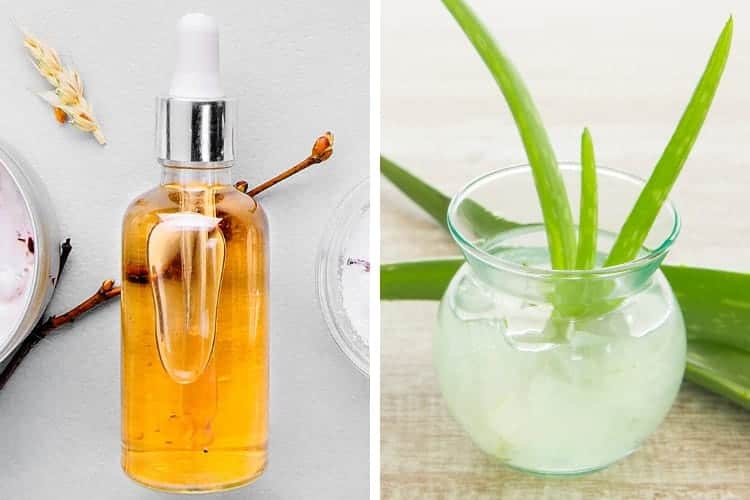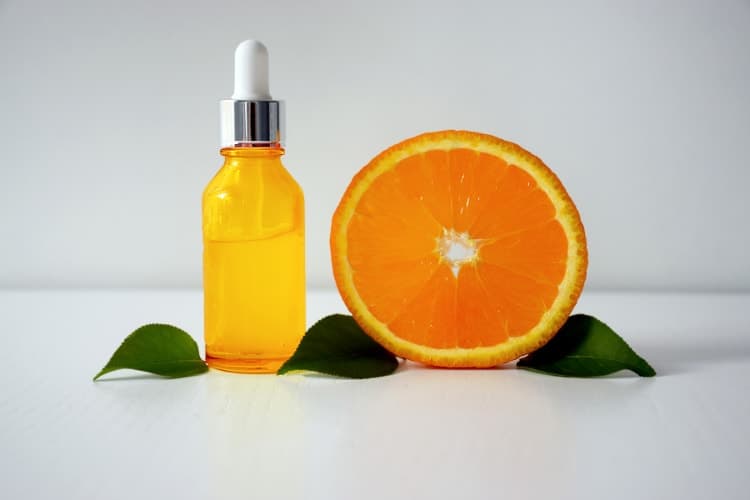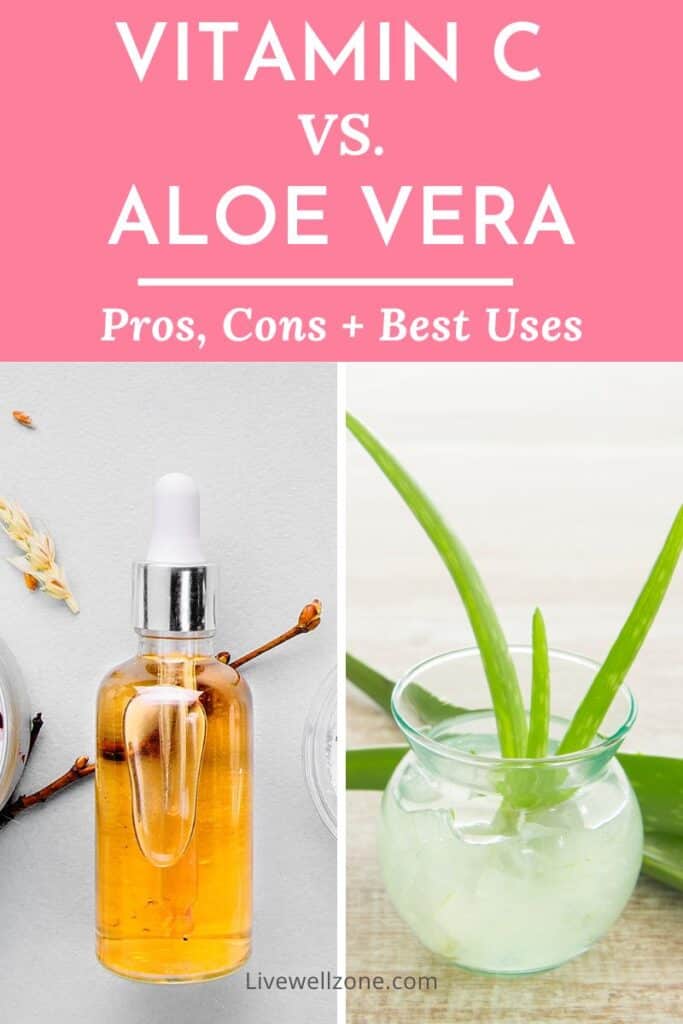
From boosting collagen to fading scars and fighting inflammation, vitamin C serum and aloe vera both provide remarkable benefits for the skin. But they also have some important differences in terms of their chemical composition, effectiveness and more. So, in this article we’re going to look at vitamin C serum vs aloe vera gel, specifically:
- their benefits.
- how to use them together.
- tips for making your own vitamin C serum with aloe.
- general tips for adding them to your skincare routine.
VITAMIN C SERUM VS ALOE VERA: MAIN BENEFITS AND DIFFERENCES
The main benefit of vitamin C serum is that it’s a concentrated source of vitamin C, usually in its pure form (L-ascorbic acid) or in the form of a derivative (such as magnesium ascorbyl palmitate and sodium ascorbyl phosphate).
Whether you use vitamin C in its pure form or in the form of a derivative, here are its main benefits for the skin:
- Improves acne scars.
- Encourages skin renewal by supporting collagen production.
- Improves inflammatory skin conditions like acne.
- Fades dark spots and hyperpigmentation.
- Protects the skin from oxidative damage.
- Hydrates the skin (as long as the serum is formulated with hydrating ingredients like hyaluronic acid, for example).
- Smoothes out fine lines and wrinkles.
Now, on to aloe vera gel. The main benefit of aloe vera is that it’s incredibly hydrating (about 99% water) and also contains nutrients help with exfoliation, fading of scars and more.
Some of the main benefits of aloe vera gel for the skin are (1, 2, 3):
- very soothing for inflamed skin (eczema, rosacea and psoriasis).
- contains long chains of sugar molecules called mucopolysaccharides, that help to keep water in the skin.
- stimulates fibroblasts, which are the cells that produce collagen and elastin, thus helping to maintain skin’s firmness and elasticity.
- contains eight enzymes (such as amylase and aliiase) that gently exfoliate the skin, giving it a smoother appearance.
- natural source of amino acids that keep the skin soft.
- improves wrinkles (thanks to its collagen-boosting abilities).
- shown to be effective at speeding up wound healing.
- contains antioxidants like vitamins A, C and E which help with acne, skin renewal and inflammation.
- natural source of salicylic acid, an ingredient that is known for helping with acne.
- contains zinc, which acts as an astringent and helps to tighten pores.
- natural source of lupeol and cinnamonic acid, which are natural antiseptics that help to get rid of microbes.
| VITAMIN C SERUM | ALOE VERA GEL | |
|---|---|---|
| Fights acne | ✓ | ✓ |
| Fades acne scars | ✓ | ✓ |
| Exfoliant | ✓ | ✓ |
| Boosts collagen | ✓ | ✓ |
| Smoothes wrinkles | ✓ | ✓ |
| Improves hyperpigmentation | ✓ | ✓ |
| Moisturizes the skin | ✓ (depending on the other ingredients) | ✓ |
| Hydrates the skin | ✓ (depending on the other ingredients) | ✓ |
| Speeds up wound healing | ✓ | ✓ |
| Anti-inflammatory | ✓ | ✓ |
HOW TO USE VITAMIN C SERUM AND ALOE VERA GEL TOGETHER

There are two ways to use aloe vera gel and vitamin C serum:
- use the aloe and vitamin C serum at separate times of the day. This can be helpful for very sensitive skin since both products contain vitamin C (and combining them could lead to irritation).
- apply the water-based aloe vera first, followed by the oil-based vitamin C serum.
As with all things related to skincare, it’s better to play it safe, which means start by using them separately and making sure that you don’t have an adverse reaction to either one of them.
Once you’re certain that your skin is okay with using them separately, you can test the layering option to see if it agrees with your skin.
HOW TO MAKE VITAMIN C SERUM WITH ALOE VERA GEL
To make a homemade vitamin C serum with aloe vera gel, you will need:
- pure vitamin C (ascorbic acid) powder.
- aloe vera gel (either fresh or bottled).
- a carrier oil (this, together with the aloe, helps to counteract the dryness of vitamin C powder).
- an antioxidant (such as vitamin E to prevent the oil in the mixture from going bad).
Here’s a quick video from Thayers showing you the exact ratios that they use for a DIY serum:
NOTE: the above recipe doesn’t use a preservative (the vitamin E only helps prevent oxidation of oils, but won’t stop bacterial growth). So, don’t be surprised if the mix goes bad within a few days.
VITAMIN C SERUM OR ALOE VERA GEL FOR FACE: SIDE EFFECTS
Some side effects that may occur when using vitamin C serum on the skin include:
- Burning or tingling sensation when first applying it (this often goes away. If it doesn’t then stop using the serum).
- Redness.
- Breakouts.
- Staining of skin and darkening of pores (this is usually due to poor formulation of the serum and/or vitamin C serum that has gone bad).
- Dryness (if the serum isn’t well formulated as far as its pH or if it’s lacking complementary ingredients that boost moisture and hydration).
Even though aloe is generally considered safe for topical use, some side effects that may occur include:
- Contact dermatitis, aka an allergic reaction to aloe. If you’ve never used aloe on your skin, it’s a good idea to do a patch test first before applying it all over your face.
- Burning sensation when using it on dry or sensitive skin.
RELATED QUESTIONS ABOUT VITAMIN C SERUM AND ALOE VERA GEL
Can we apply aloe vera on the face daily?
Since aloe vera gel contains mostly water, it’s very gentle on the skin and most people can use it daily. Also, it’s important to note that the best type of aloe to use every day is the type that comes from the fresh plant. If you’re using store bought aloe vera products, pay close attention to the ingredients. Some of them may contain harsh items that create adverse effects.
Can I use Vitamin C serum every day?
If you’re new to using vitamin C serums, it’s a good idea to use them every other day and then eventually transition to daily use. Do keep in mind that experts have different opinions on what time of day to use vitamin C. Some say morning (to protect the skin from environmental damage) while others say nighttime (to help the skin recover from everything it’s exposed to throughout the day). It all boils down to personal preference.
Personally I lean towards using serums at night because they’re intense, restorative treatments. It makes sense to put them on before you sleep since the skin is busy doing most of it’s renewing while we sleep.
How long does it take for aloe vera to work on dark spots?
According to one study, applying aloesin – a compound found in aloe vera – 4 times a day for 15 days leads to a 34% reduction in hyperpigmentation (source). In addition, an animal study also showed that extracts from the aloe vera leaf and the ingredient aloin, are also effective for hyperpigmentation (1, 2)
How long does it take for vitamin C serum to work?
It can take four weeks or more to start seeing results from vitamin C serum. This is because vitamin C serum impacts the overall structure or makeup of the skin. As a result, it requires consistent and long-term use to see significant changes.
CONCLUSION
Overall, vitamin C serum and aloe vera have many similar benefits for the skin. However, the main benefit of using aloe vera gel is that it contains additional vitamins, minerals and antiseptics that help to soothe and improve the skin.
Whichever one you choose to go with, make sure to prioritize quality.
So, if you choose to use fresh aloe, try to find that’s organically grown (so that you avoid the potential side effects of pesticides).
As for vitamin C, make sure to choose the right type of vitamin C for skin, while also paying attention to the packaging and the additional ingredients. To learn more about this, read this guide on how to choose the best vitamin C serum.

You Might Also Enjoy:
Vitamin C vs Squalane: Benefits and How to Use Them for Radiant Skin
Aloe Vera or Shea Butter for Sunburn: Which Is Better?
A Complete Guide to Retinol vs Aloe Vera (and Why You Should Use Them Together)
Vitamin C Serum vs Rosehip Oil: Benefits, Which Is Better and How To Use
Honey vs Aloe Vera for Face: Benefits, Best Ways To Use and Recipes
Aloe Vera vs Hyaluronic Acid: Are They Similar? | How to Add to Skincare Routine
Best Vitamin C Serum For Sensitive Skin: 7 Products to Transform Your Skin
Best Vitamin C Serums for Rosacea (To Soothe Redness and Inflammation)

